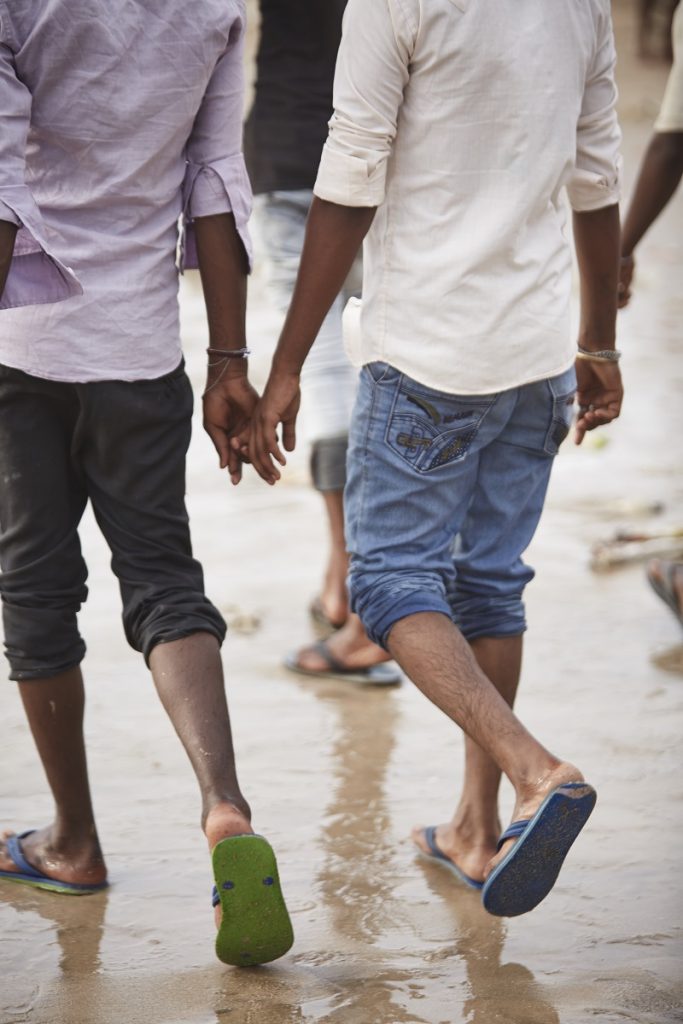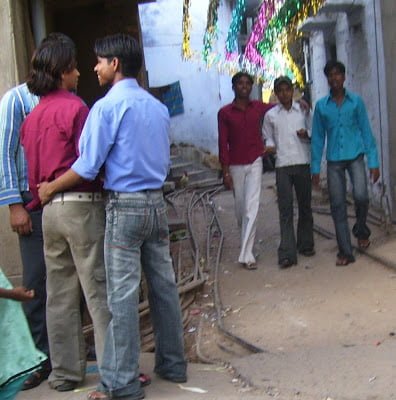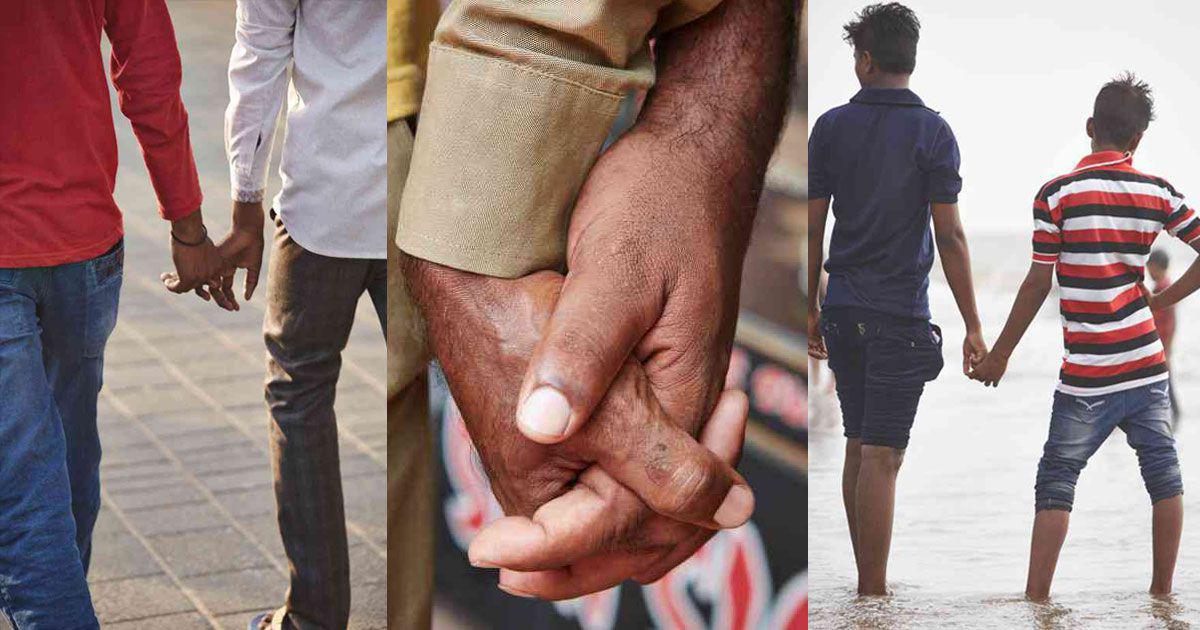Editor’s Note: This month, that is September 2020, FII’s #MoodOfTheMonth is Boys, Men and Masculinities, where we invite various articles to highlight the different experiences of masculinity that manifest themselves in our everyday lives and have either challenged, subverted or even perpetuated traditional forms of ‘manliness’. If you’d like to share your article, email us at pragya@feminisminindia.com.
Each time I visited my family in Gwalior, I noticed that there were always boys walking together holding hands, my male cousins hugging, or even wrapping their arms around one another.

“Aap dono ek dusre ko aise kyu choo rahe ho?” I always asked them in the most American accent that I wish I could get rid of when speaking Hindi.
They slowly retracted their arms and let go of one another. I didn’t care that they were upset, I just didn’t want to see that. I was homophobic. Just because I was taught these views, does not rid me of any blame. I was old enough to research and understand my homophobic behavior. I even remember joking around with my friends where we made fun of each other by referring to each other as feminine and called each other “chakka.”
I didn’t understand that making these jokes perpetuated prejudice toward the gay and trans communities. I also failed to empathise and truly understand how the trans community suffers every day. But the root cause is that gay rights and trans rights aren’t taught in our curriculum. The same way Black history is inappropriately left out from American history, LGBTQIA+ history is also intentionally ignored.
I was homophobic. Just because I was taught these views, does not rid me of any blame. I was old enough to research and understand my homophobic behavior. I even remember joking around with my friends where we made fun of each other by referring to each other as feminine and called each other “chakka.”
A few years ago, my friend asked me what I would do if my future son wasn’t interested in sports like I am. I responded by saying that he has to be; I would make sure of it by exposing him to sports when he is young. There were obviously many things wrong with my answer. I believed that because sports helped me socialise in my life, that my son would need it too. On another note, who am I to assume my son’s gender? Why would I choose to say “he” instead of “they” or “her”?
Why did I conform to heteronormative culture? Many people would respond to this by saying I am being too soft and politically correct. To them I say, what does being ‘hard’ accomplish? Many people also mask their xenophobic tendencies by calling inclusive behaviors as “too politically correct.”
I was the symptom of a transphobic and homophobic society and I perpetuated these beliefs. But why did I see emasculating jokes as ‘insults’? Why does masculinity have to be binary? I never thought of these questions and blindly embraced a culture of toxic masculinity. This is far too common in men. We are taught that not being “a man” makes us soft and look weak. Is this because our parents and media indirectly teach this to us, or because of conformity within our peers?
It is a combination and until, we actually think for ourselves, this discriminatory culture will continue. I later realised that masculinity can mean different things and there is no scale to measure it. Masculinity is something we define that makes us a man. It is impossible to say whether or not a person is masculine because we do not know their definition of being a man.
I remember I was on a train to Indore and my sister and my dad were explaining to me how hanging out with gay people can make someone gay. I tried explaining to them that you can’t choose your sexuality, but they wouldn’t listen. In another instance, I told my parents that my close friend is gay, and they said not to hang out with him too much. I once again explained that I shouldn’t treat him differently just because he is gay, but they wouldn’t listen. Far too many times they were unwilling to understand my perspective.
It is not enough to not be homophobic. We need to hold our family and peers accountable. During my time at university, I heard students using the word gay as an insult. These are our future healthcare workers, public servants, and police officers. If the people working in jobs of high moral compasses are holding these prejudiced beliefs, are their professions being properly conducted?
As I became exposed to different perspectives in college, I started to research more about masculinity and questioned the culture I grew up in. I remember reading examples of toxic masculinity and saw some of these in myself. I became ambitious and challenged my parents on their thoughts. I brought up the fact that a woman always has to change her last name upon marriage, has to wear a Mangalsutra, while a man does not have to show that he is married. Why is this?
Initially uncomfortable and unwilling to participate in the conversation, they came around to accepting my point. They told me that they were told to believe what their parents taught them without refutation. As a result of this, they struggled with having conversations about ideas that conflicted with their views.
Fortunately, as the child of a Hindu mother and Muslim father, they raised me to be open minded and allowed me to question tradition. But at the same time, my parents say that I act like a girl if I am being emotional or talkative. It is also important to note that not everyone is able to discuss progressive topics with their parents. Although we cannot always find a common ground, it is healthy to have honest and uncomfortable conversations to continue challenging ourselves.
Also read: Bisexuality Awareness Week: What In Means To Be Bisexual In India
Gender socialisation is also taught to us as kids and retained as we grow older. Our parents of course directly and indirectly teach this to us, but the media plays a significant role. I often play a game when I am watching TV commercials. I count how many characters in these commercials include people of color, gay/trans people, or any other oppressed group. Unsurprisingly, I can always count this number on one hand by the time my TV program starts again. It might feel as if the media is becoming more inclusive, because it is, but is it enough?
Making a change cannot be judged on a binary scale. We can’t keep labeling a company progressive because they aired a touching commercial on gay pride or because they published a statement supporting trans rights. The extent to which the company supports these groups must be the focus.

It is not enough to not be homophobic. We need to hold our family and peers accountable. During my time at university, I heard students using the word gay as an insult. These are our future healthcare workers, public servants, and police officers. If the people working in jobs of high moral compasses are holding these prejudiced beliefs, are their professions being properly conducted? Or do we blame the system for keeping these closed-minded beliefs present? It is of course erroneous to place blame on only one entity.
As we become more inclusive as a society, we will continue to find problems with systems of the past. But far too many people are afraid of changing the system. They say if it worked for them (the privileged group), it should equally benefit others (the oppressed). Improving as a society doesn’t require input from the oppressors, but we need to listen to the groups under attack each day.
Also read: Why Does The Mass Media Still Trivialise Male Rape?
None of us are perfect. None of us will fully become all knowing. But we must be open minded and amplify the voices of the oppressed. For without listening, how can we understand? The best way to improve our concept of being men is to keep questioning the system of masculinity we have in place. At the end of the day, it is the responsibility of the oppressors to create progressive change, the victims of the system are already suffering too much.
Featured Image Source: Scroll




